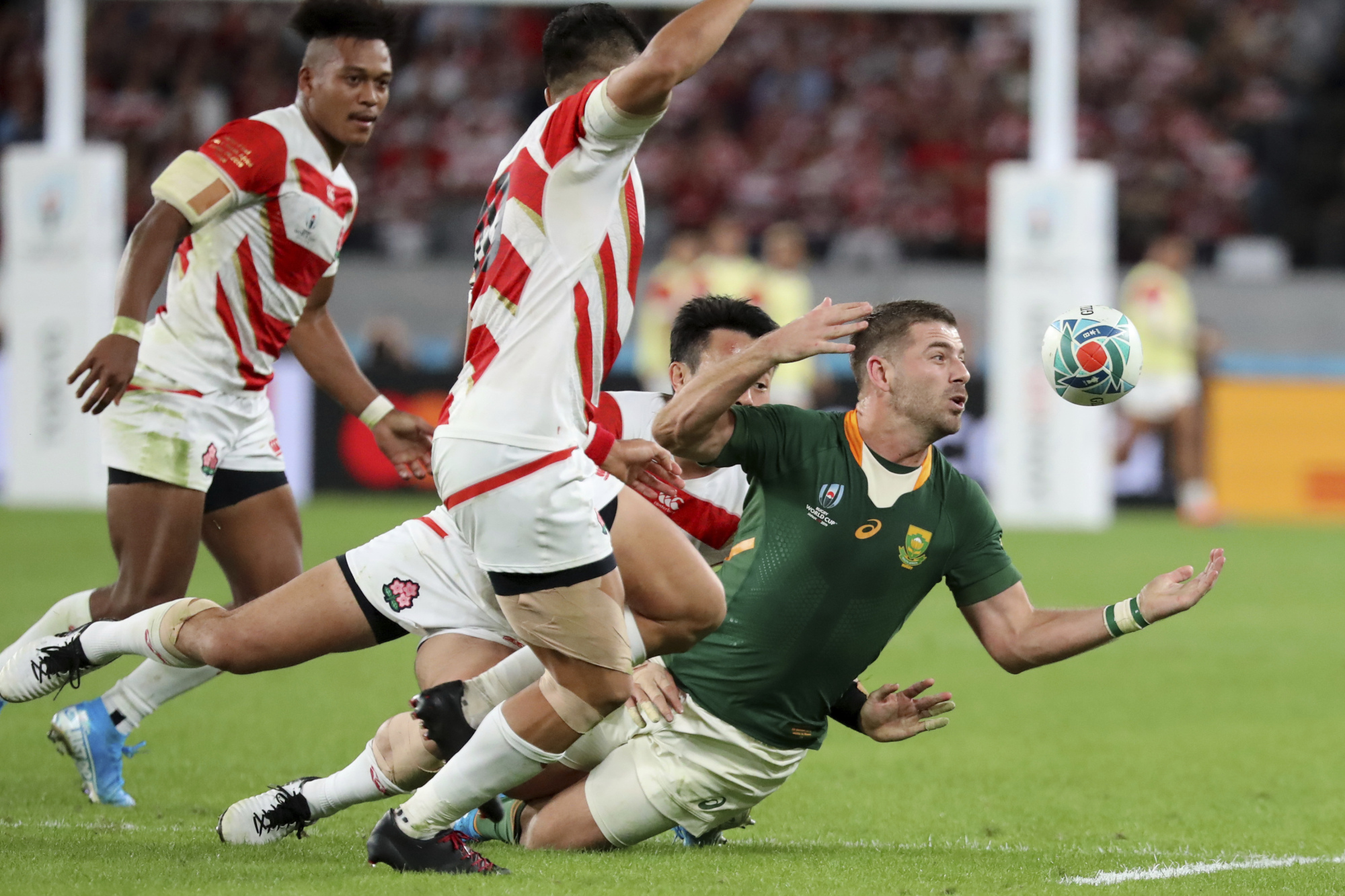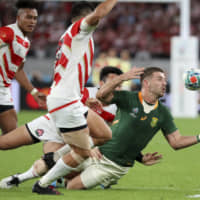Japan's Rugby World Cup players expressed mixed feelings as their incredible campaign came to an end with a quarterfinal defeat to South Africa on Sunday, with pride in their achievements largely crowding out the disappointment.
"It was really emotional when the final whistle went," said flanker Pieter Labuschagne, after Japan had exited the tournament with a 26-3 loss to the Springboks at Tokyo Stadium. "So much time and effort went into this campaign, and it all came to an end. But I was also feeling really proud of the way that we played throughout the World Cup. The way that we represented ourselves and executed our plan from the first game right up until now.
"We have to give South Africa credit as well. They're a really good side and they played really well. We were still in it at halftime and they just kept on building an innings and took it away from us. I'm sad that it all came to an end but also proud of the way we played throughout the World Cup."
Japan ran two-time champion South Africa close for much of the Brave Blossoms' first-ever appearance in a Rugby World Cup knockout match, falling behind to an early Makazole Mapimpi try but still heading into halftime only two points behind after another impressive performance.
South Africa's fearsome physical presence proved too much for Japan to live with after the break, and three penalties from Handre Pollard and tries from Faf de Klerk and Mapimpi eventually allowed the Springboks to pull away.
Japan head coach Jamie Joseph lamented his team's error-strewn start to the second half but preferred to reflect on its overall performance at the tournament, where the Brave Blossoms beat Russia, Ireland, Samoa and Scotland to top Pool A and charmed the watching world with their swashbuckling style of high-tempo rugby.
"The players and the brand of rugby that we've been playing all year, really, is inspiring," Joseph said. "The only difference is that everyone is watching us now. The rugby hasn't changed. The opposition has changed, the pressure has changed, the tournament is obviously the World Cup. There's been an audience that's created a lot of noise for the team. In that respect, with regards to promoting the game for young Japanese kids, it's ideal."
South Africa pummeled Japan with its brutal, forward-based game to such an extent that Joseph said standoff Yu Tamura had suffered a suspected broken rib.
The Springboks will now play Wales in the semifinals in Yokohama on Oct. 27, and head coach Rassie Erasmus was relieved to progress after admitting he felt "nervous" about his team's position at halftime.
"I don't think it was ever a lack of effort in the first half," he said. "It was more the pressure that Japan put on us with the amount of effort and tenacity and intensity that they put onto us in the first half. I think we did really well in terms of intensity but in terms of execution we weren't really right.
"To the Japanese public, you can be proud of the way you're hosting this World Cup, you can be proud of the way your team performed. To make the top eight and to top your pool against Tier-1 nations Scotland and Ireland and then perform the way they did against us today — we were nervous at halftime. So, overall, I think Japanese rugby is in a really good space."
The Brave Blossoms' achievements at the World Cup have sparked a wave of rugby fever around the country, with the team's win over Scotland on Oct. 13 being watched by a domestic TV audience of 54.8 million.
Attention will now turn to how Japanese rugby can capitalize on its new-found popularity, but winger Lomano Lemeki believes there is potential to challenge more established sports and gain a long-term foothold.
"Soccer and baseball have always been the top two sports," he said. "After this World Cup, where we showed what we can do, I think schools should start getting rugby more involved. We finished first in our pool, although we didn't win today. Rugby really brings Japan together, as you have seen with the typhoon and with how people were behind us today.
"We're not the biggest team, but the type of game we want to play suits every Japanese player or future Japanese player. The way we play with speed and skill and agility."
Joseph refused to comment on his immediate future after the match, but the New Zealander is confident his team is in a good position to build on its achievements.
"I can't tell you anything about what's next," he said. "I know that Japanese rugby is in a good place now. It's like every rugby team, you create a good team. We've got some experienced players, who can pass that on to the younger players. The younger Japanese players that we've been able to bring through are the future for Japanese rugby.
"For me, I'm just going to really celebrate the efforts and achievements of this team. It's been a lot of work. It's been relentless. I have to pay all of the credit to the team because that's what we are. That's how we operate and that is why we've achieved."




















With your current subscription plan you can comment on stories. However, before writing your first comment, please create a display name in the Profile section of your subscriber account page.